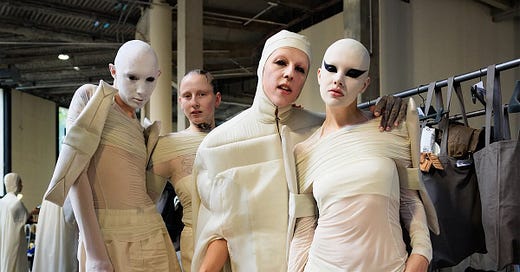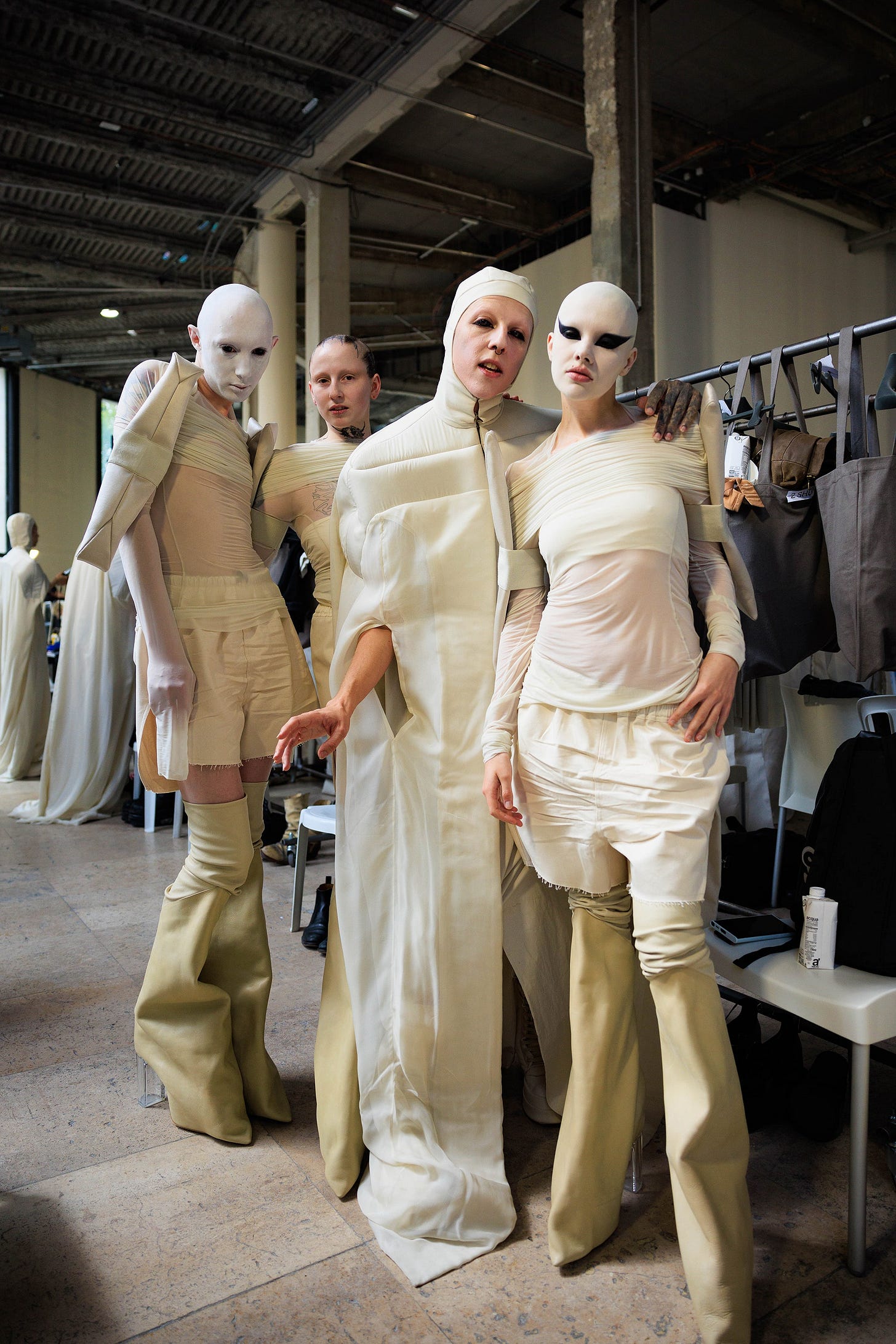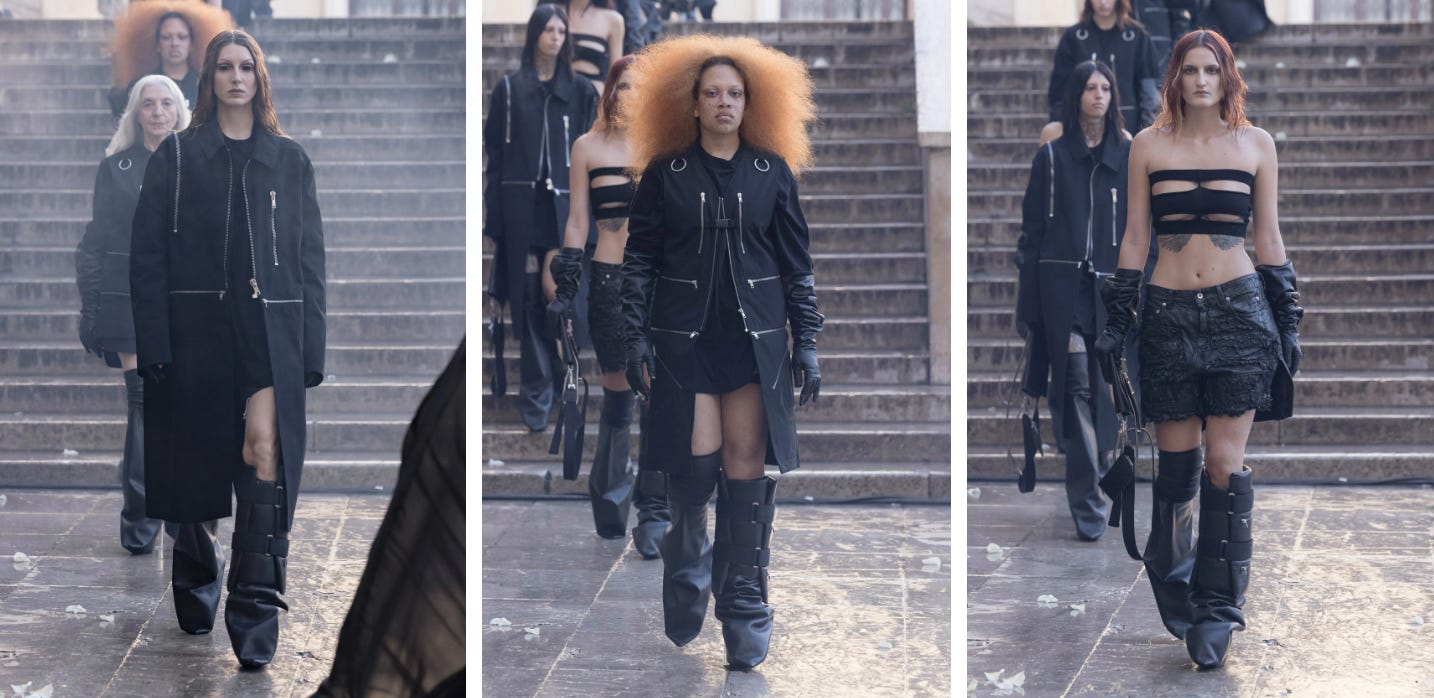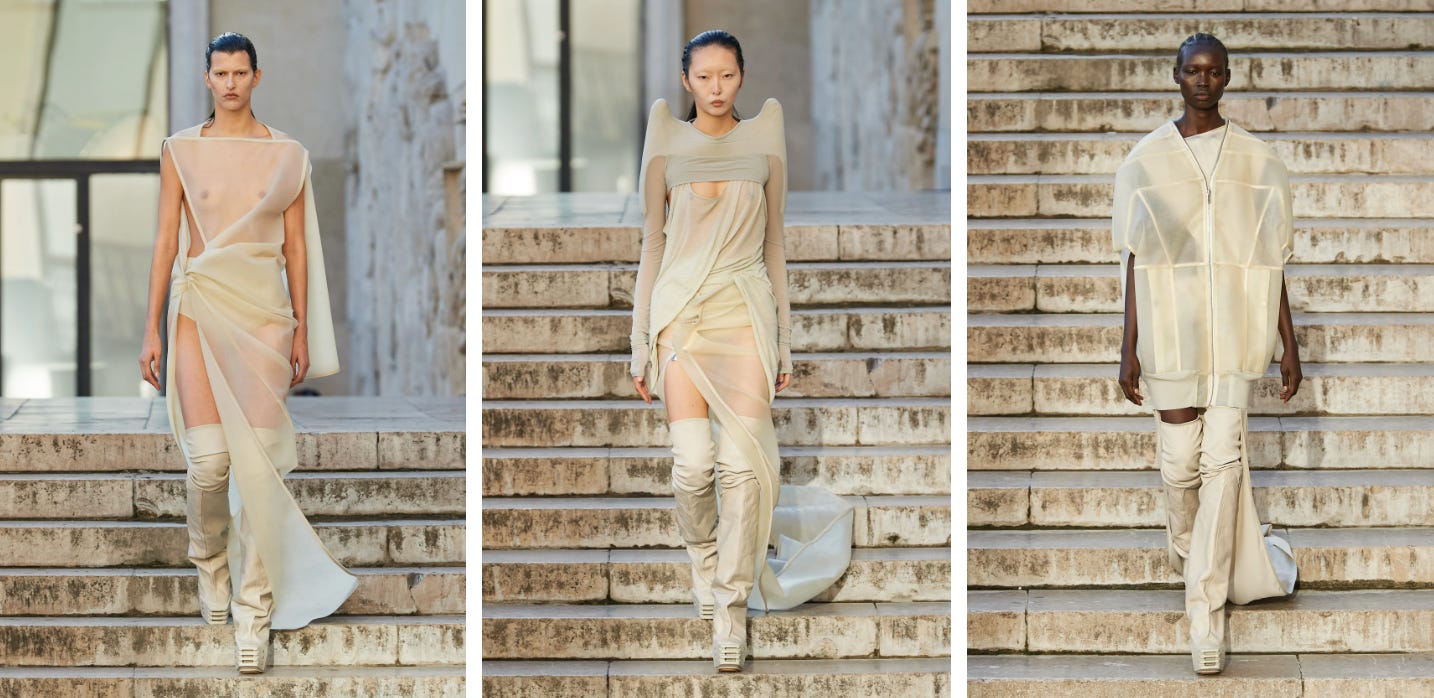A few weeks ago, I published a quick-hit piece on French artist Yseult, who turned heads in New York by strutting through the city in full Rick Owens. It was the first time I’d seen someone wear Rick and not look like yet another carbon copy of the “EDM-loving pseudo-punks” the brand seems to cater to on its runways.
To be clear, this wasn’t meant to be a deep dive into the aesthetic implosion of Rick Owens’ world—though that’s a conversation I’m happy to have. It was more of a momentary celebration: proof that the brand can still inspire something fresh, even as I’ve grown weary of its increasingly predictable edge.
The internet, unsurprisingly, had thoughts. Strong ones. “Calling absolute bullshit on this because why would you blame a brand for developing their own language and world building and aesthetics?” a Threads commenter snapped. “Blame the internet for fashion imagery to be easily accessible because a brand IS successful when its wearers have a certain look. Why is it that Celine wearers are heralded as quirky, quiet luxury but the Rick wearers are caricatures of runway looks?”
Touché. It’s not wrong to argue that Rick’s consistency in cultivating a niche is, in fact, a hallmark of luxury. But then, others resonated with my initial reaction. “Yessss!!!! Finally, someone bold enough to say it,” a fashion socialite messaged me. “There is something about the weirdness that’s virtually inappropriate for all normal situations that makes it interesting to some people,” another colleague confessed.
So, where do I stand now? Maybe I was slightly harsh in calling Rick Owens a caricature of himself. The man has a vision, no doubt, and has built an ecosystem for people who want to buy into it fully. But isn’t there a tipping point where being so narrowly defined starts to hurt a brand’s cultural cachet?
This week, I stumbled on a video by Yulia Fomenko, who asks, “Can I wear Rick Owens without being a Rick Owens girl?’” Apparently, I’m not alone in wondering if the brand has boxed itself in so tightly that even the most effortlessly stylish among us wonder how they can escape its grip.
As an editor, my job isn’t to impose my take on the zeitgeist but to chronicle it. And the fact is, people are talking about Rick Owens—some of it is great, but not all of it is glowing. That’s something the brand might need to reckon with if it has plans to expand beyond its current loyalist base.
Below, I’ve rounded up five unfiltered opinions from consumers, industry insiders, and die-hard Rick fans. I’m listening to the people! If you’re curious about where Rick Owens stands in the dialogue between consumerism and authenticity, we’ve got you covered.
Eugene Kan (@eugenekan)
KAN: Thinking about the realities of building a (fashion) brand over an extended period, I think it’s worth considering its impact on how a brand ends up being represented in the real world.
Fashion, we can mostly agree, is about identity formation and the ability to quickly communicate a message/idea/position. We can also mostly agree that dressing head-to-toe in the same brand can be a bit boring.
It’s a powerful compliment to brands who can still have peeps dripped out in a world where “brand building” has lost its luster. We lament the lack of narratives/meanings from brands and how nobody really “world builds” anymore. They’re just individualized garments that may or may not look good. Give kudos to the Rick Owens/Hirokis/Errolsons for continually staying the course and having enough gravity to keep people dressed accordingly.
RICE: I think you make a great point about identity formation. There’s a world in which we actually need more brands like Rick Owens to ground the fashion industry in purely original identities. Insular buyers are great in the larger context of culture for the hubs they create but become derivative within the niche context.
KAN: My friend and I were recently discussing how taste is everything and nothing at this point in time. And taste has been trumped by “meaning and personal connection.” It doesn’t matter cause the narrative is secondary to “What does it mean to me” and “Do I fuck with it?” And if that’s all it takes, it makes a lot of these conversations pretty much moot, in a way. Monobrand fits with the “right” brands are a hyper-optimal way to signal affluence (cause it’s expensive), taste (relatively speaking if it’s the right brand), and appeal (relatively speaking, since it’s all part of the same world/synergistic)
I’m just as guilty as the monobrand thing with VEILANCE.
RICE: I am curious if you think being too niche hurts the brand, though. I think of labels like Balenciaga under Demna, where they’ve been able to create a very rigid identity for their consumer, but the brand is still accessible through individual pieces for the average buyer. Or perhaps you think Rick Owens has done well in this department, too?
KAN: I actually think that at some point as a brand, you’ve leveled up and created somewhat of a foundation for repetition and “expectation” because of a feature and not a bug. Meaning, the outward message one portrays through wearing a brand of a certain scale is continued positive reinforcement. I wear X brand because it means Y and enough people recognize this.
I’ve always felt fashion was such a fascinating business case because it ebbs and flows so much. Get big, and the brand becomes wack due to the wrong people. But it gets REALLY big, and it just becomes a cash cow where branding matters very little.
Tyler Reese (@itstylerreese)
REESE: As the democratization of fashion has made luxury more accessible, Rick hasn't lost its cool, but more so exposed how much many of his fans conform, adopting the "Rick uniform" as a way to signal belonging rather than expressing individuality. Those hardcore Rick-heads will have you believe that his aesthetic can only be worn a certain way or that the rigidity of the brand limits it, but it's the wearer's responsibility to bring their own nuance.
RICE: It sort of sounds like you’re saying that unlike many of their brands, the consumer has taken it upon themselves to dictate the rules in which Rick Owens can and can’t be worn. Of other brands that have cult followings, I don’t know many that have an audience so rigid in their own appreciation of the brand.
REESE: There was a time when I wanted to be a part of that Reddit or style zeitgeist Rick club, but for me, a complete Rick outfit feels performative—almost like cosplaying Rick himself—which is why I mix his pieces with brands that may not be cool but are true to my style like Versace, DSquared, etc or fast fashion (don't kill me). This approach feels authentic to who I am. Fashion should be about storytelling, not just fitting in or, worse, cosplaying as Rick himself, which is the antithesis of what I think Rick stands for.
Bayo Omole (@bayoomole)
OMOLE: The brand has become a subculture of its own. Much like the punks, goths, grunge, teddy boys, or even Ivy style, there is a specific look to Rick that demands you to commit fully. Yes, you can pick up a leather jacket, one of his tissue-thin draped t-shirts, or Geobasket sneakers to dip your toe into his world. But in my eyes, the true fan dives in head first. Why buy one of his Porterville boots if you don't pair it with other OTT items from his collection?
You can draw similarities between him and Comme des Garçons, There are individuals who curate and live by the "Comme look." Again, to choose a spectacular runway look, you might as well just go there and complete the vision as Rei saw.
RICE: Do you think the Rick Owens brand allows for full immersion? Or does the strong identity they’ve developed create a barrier to entry for new customers? The latter seems to be a sentiment I’ve heard a few times, but I'm curious about your thoughts.
OMOLE: I don't think they've developed a barrier. I think if the lifestyle appeals to you, the full thing, then you'll probably just go for it! For me, I've watched his shows, read interviews, and really paid attention to the space he's carved out, and I realize it's the complete opposite of my personal style. But I've gone into stores to see the product, and when deconstructed, there are great t-shirts, leather jackets, shirts, tailoring, and outerwear that can slip into any wardrobe!
[Rick Owens] also has diffusion lines that allow for the essence of their brands for a more "commercial" appeal. But to embrace the strangeness, the otherworldliness is to live it fully.
I think that's the joy of fashion, is you can definitely pick a piece from one designer, and another and bring your own style and vision to it. But other times, you enjoy the world a designer builds, and you want to join that club. It's not a caricature; it's embracing something and loving it. Pure and simple.
Jia Lioetta (@lioettt)
LIOETTA: I don't really think the aesthetic of Rick Owens is that distinct, taken out of the context of a runway show. Just taking a glance at the most recent collection, it's a lot of black, some drapery, some sheer fabric, and nothing that screams a distinctive brand identity to me (except for the shoes).
The entire ready-to-wear collection is just elevated athleisure basics cut sleekly. I would point to paparazzi photos of Taylor Swift wearing Rick Owens in the mid-2010s, where I would have never guessed the brand without the tagline because, without the context of a luxurious Paris fashion show, the garments themselves are basic.
The overt Rick Owens consumer is just influencers and celebrities who get paid to wear those clothes and have stylists decide these things for them. (I don't believe that the average consumer is spending 5k on head-to-toe Rick Owens.) These types of runway looks fill our feeds because they are a marketing tactic; plenty of brands do the same thing, dressing influencers or celebrities in head-to-toe runway looks.
An example of a brand doing this on the complete opposite end of the spectrum is Chloé. In their FW24 campaign, they dressed multiple celebrities in runway looks, and the effect was more or less the same as the blandness and laziness you wrote about in the article. So, I think the point is to look like a runway clone, and the reason this is happening is not because of a lack of imagination but because of the desire to sell more clothes.
RICE: You make a great point about generating viral sensations through influencer and digital marketing. I’m curious if you think that’s what Rick Owens is doing or if you think it’s organic and audience-driven.
LIOETTA: I don't think it's very organic. From what I see on my fyp, the influencers serving up full head-to-toe Rick Owens fantasy are often either attending a Rick Owens show or being gifted the pieces. Most of the time, when I see Rick Owens on my fyp, it's not really about the clothes; it's about the spectacle and the glamour of everything associated with the brand.
Ni Biết Biết Không Ni (@nioinioini)
NI: I think it’s neither the brand’s nor their buyers’ fault that there’s a certain look from the Rick wearers. After all, successful brands will have devout fans who will carry out the intended look/world of the brand.
It’s rather unfair to me that the (general) Chanel woman with her tweed and her quilted bags is classy and chic, or the Céline woman is tasteful, understated, and powerful. Yet, the Rick wearer is deemed a ‘caricature of the Rick Owens’ runway. It’s just a brand building its world, and if a PART of Rick’s world consists of annoying tech bros with a lot of money buying Kiss Boots and stumbling on them, then that’s just a part of his world.
We also have to be reminded that plenty of fashion buyers don’t show themselves on the internet, and thus, we shouldn’t base what we see on Instagram as the entirety of the fashion landscape. I know plenty of people (in Vietnam even) who buy Rick, even runway pieces, just to wear around to exhibitions and outings, and they happen not to dress in the aforementioned way.
RICE: Do you think there’s an opportunity for Rick Owens to release a bit of his rigid aesthetic, though? I think you’re right in that the classic Chanel buyer is in a similar boat. But unlike Owens, Chanel has a much broader audience, so you see, more often than not, shoppers buying products and mixing them with their own lower-priced goods. Versus Rick is on a much smaller scale, and their shopper is more concentrated. From a business perspective, I think it would benefit the brand to be more commercial. What do you think?
NI: I don’t think there’s a point for that. People do buy and wear Rick with other stuff, they just don’t show themselves online as often as the devoted all Rick lookers. I’ve got RO in my wardrobe, and I don’t wear them in that manner. We also have to realize that the DRKSHDW shoes are the equivalent of Chanel bags/wallets in terms of accessibility, and people do integrate those shoes into their wardrobe. That’s the commercial part of Rick.
We should all stop to realize just how big and widely (commercially) successful Rick Owens as an entity is. Which independent brand has its own supply and manufacturing chain and stores all over the world? A brand like Rick is already commercially successful, and the net they cast is quite wide. ♣♠
Find us on every platform that matters…
Instagram, Twitter (X 🙄), Pinterest, TikTok, @club_andspade










